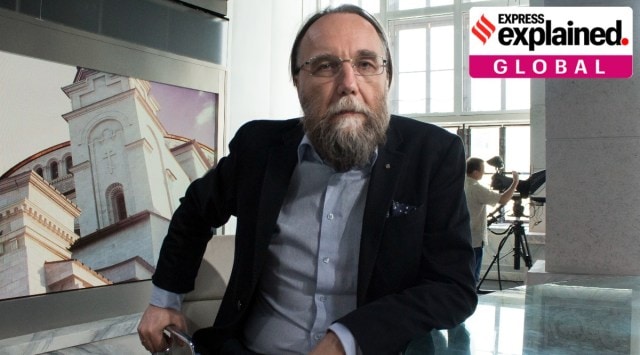Explained: Who is Alexander Dugin, a prominent backer of Putin’s Ukraine war whose daughter was killed in a car blast?
Sixty-year-old Dugin is an influential writer, political philosopher and analyst who is well known for his intellectual influence on Russian President Vladimir Putin.
 In this photo taken on Thursday, Aug. 11, 2016, Alexander Dugin, the neo-Eurasianist ideologue, sits in his TV studio in central Moscow, Russia. (AP Photo/Francesca Ebel, File)
In this photo taken on Thursday, Aug. 11, 2016, Alexander Dugin, the neo-Eurasianist ideologue, sits in his TV studio in central Moscow, Russia. (AP Photo/Francesca Ebel, File)The daughter of a Russian nationalist ideologue and a powerful ally of President Vladimir Putin was killed in car bomb blast on the outskirts of Moscow Sunday.
Daria Dugina, the 29-year-old was the daughter of Alexander Dugin, was in an SUV when the bomb went off.
According to Russian media reports, the vehicle belonged to her father and that he had decided at the last minute to travel in another car. Dugina was returning from a cultural festival she had attended with her father.
 Investigators work at the site of a suspected car bomb attack that killed Darya Dugina, daughter of ultra-nationalist Russian ideologue Alexander Dugin, in the Moscow region, Russia August 21, 2022. (Reuters)
Investigators work at the site of a suspected car bomb attack that killed Darya Dugina, daughter of ultra-nationalist Russian ideologue Alexander Dugin, in the Moscow region, Russia August 21, 2022. (Reuters)
According to a report in the Associated Press, Denis Pushilin, president of the separatist Donetsk People’s Republic that is a focus of Russia’s fighting in Ukraine, has blamed the attack on “terrorists of the Ukrainian regime, trying to kill Alexander Dugin”.
‘Putin’s brain’
Sixty-year-old Dugin is an influential writer, political philosopher and analyst who is well known for his intellectual influence on Russian President Vladimir Putin.
The Moscow-born author of more than 30 books is also sometimes referred to as “Putin’s philosopher” or “Putin’s brain”. However, while some Russia watchers support the idea of his significant sway, others call it minimal.
Dugin, according to The Washington Post, rose to national prominence in the 1990s while writing for the Den, a far-right newspaper.
He was also the former chief editor at Tsargrad TV, a network backing Putin and the Russian Orthodox Church.
According to a BBC report, Dugin is seen as a symbolic figure in Russian politics despite not holding any official state position.
His political views
Russia’s current political ideology is believed to be dominated by Dugin’s views.
Known for his ultra-nationalist, anti-West views along with a vision of a more powerful and aggressive Russia, Dugin has long advocated the unification of Russian-speaking and other territories in a vast new Russian empire.
“A 1991 manifesto serialized in Den, ‘The Great War of the Continents’, laid out his vision of Russia as an ‘eternal Rome’ facing off against an individualistic, materialistic West,” noted the Washington Post in an article in May.
His 1997 work, the ‘Foundation of Geopolitics: The Geopolitical Future of Russia’ is considered one of his more influential works of the post-communist period, which the Foreign Policy magazine called “a pole star for a broad section of Russian hardliners”.
“Dugin’s main argument in Foundations came straight from (Karl) Haushofer’s pages: the need to thwart the conspiracy of ‘Atlanticism’ led by the United States and NATO and aimed at containing Russia…The plan was simple: first put the Soviet Union back together, counseled Dugin, and then use clever alliance diplomacy focused on partnerships with Japan, Iran, and Germany to eject the United States and its Atlanticist minions from the continent,” the Foreign Policy article noted.
Role in Ukraine war
Dugin has been a staunch backer of Putin’s Ukraine war. He was also targeted by US sanctions for his links with militants in eastern Ukraine. A proponent of the idea of Novorossiya (New Russia), he is also considered the ideological author of Putin’s Ukraine strategy.
Dugin is known to hold the view that an independent Ukraine poses a “huge danger to all of Eurasia”, and that the total military and political control of the whole north coast of the Black Sea was an “absolute imperative” of Russian geopolitics. He has also pushed the idea of Ukraine becoming “a purely administrative sector of the Russian centralized state”, an essay in the New York Times said.





- 01
- 02
- 03
- 04
- 05

































